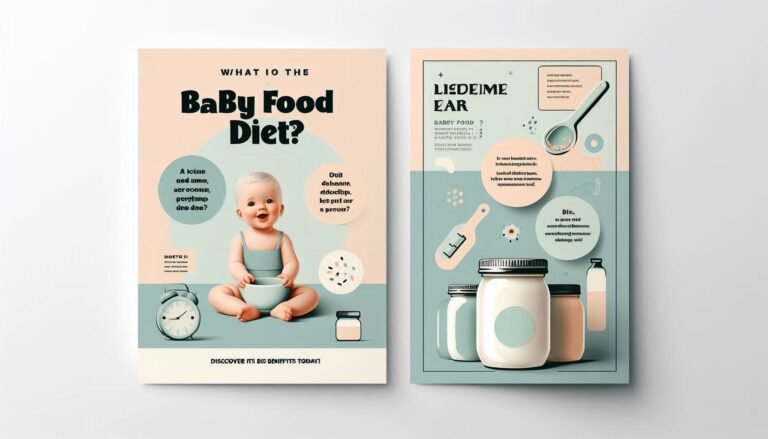In the ever-evolving world of dieting, new trends emerge with surprising regularity. One such trend that has garnered attention is the Baby Food Diet. But what exactly is this diet, and how can it impact your health and wellness? In this comprehensive guide, we’ll delve into the details of the B;aby Food Diet, exploring its benefits, potential drawbacks, and whether it might be a viable option for you.
Understanding the Baby Food Diet
The Baby Food Diet involves replacing one or two of your daily meals with jars of b’aby food. The concept is straightforward: consume the same pureed foods that babies eat, which are generally low in calories and high in nutrients. This diet gained popularity in part due to its endorsement by celebrities and its seemingly simplistic approach to weight management.
How Does It Work?
Typically, followers of the Baby Food Diet consume several jars of baby food throughout the day, often substituting them for breakfast and lunch. The diet might include a balanced dinner of regular food to ensure that you receive adequate nutrition. Some variations of the diet also allow for snacks and occasional treats.
Benefits of the Baby Food Diet
- Portion Control: Baby food is pre-portioned, which can help with controlling calorie intake. Each jar is designed to be a single serving, making it easier to manage portion sizes and avoid overeating.
- Nutrient-Dense Options: Many baby foods are packed with essential vitamins and minerals, such as vitamin A, vitamin C, and iron. These nutrients are important for overall health and can contribute to a balanced diet.
- Convenience: Baby food jars are easy to carry and require no preparation, which can be a major convenience factor for busy individuals.
- Low-Calorie Intake: Baby food is generally low in calories, which can aid in weight loss if consumed in moderation and combined with a healthy dinner.
Potential Drawbacks
- Nutritional Imbalance: Relying solely on baby food may result in a lack of variety and potentially insufficient intake of certain nutrients. It’s important to balance the diet with other food groups to meet all nutritional needs.
- Limited Satiety: Baby food is designed to be light and easy to digest. Some individuals may find it less satisfying compared to regular meals, leading to increased hunger and potential overeating later.
- Social and Lifestyle Factors: Following the B’aby Food Diet can be challenging in social settings where regular f’ood is the norm. It may also feel restrictive for those who enjoy a variety of textures and flavors in their diet.
- Cost Considerations: High-quality baby food can be expensive, especially if consumed regularly. It’s important to consider the cost implications when planning your diet.
Is the Baby Food Diet Right for You?
Determining if the B’aby Food Diet is suitable for you involves assessing your personal health goals, dietary preferences, and lifestyle. If you’re looking for a structured approach to portion control and calorie reduction, this diet might offer some benefits. However, it’s crucial to ensure that your overall diet remains balanced and nutritious.
Consult a Healthcare Professional: Before making significant changes to your diet, including trying the B’aby Food Diet, it’s always wise to consult with a healthcare provider or a registered dietitian. They can provide personalized advice based on your health status and nutritional needs.
Conclusion
The B’aby Food Diet presents an intriguing approach to weight management and portion control. Its benefits, such as convenience and nutrient density, make it a popular choice for some. However, potential drawbacks like nutritional imbalance and limited satiety should be carefully considered.
If you’re curious about this diet, approach it with a balanced perspective and be mindful of your overall nutritional intake. Remember, the key to successful weight management and healthy living lies in finding a diet that supports your long-term well-being and fits seamlessly into your lifestyle.
Ready to explore new dietary strategies? Start by incorporating baby food into a balanced diet and observe how it fits with your health goals. For more tips on healthy eating and weight management, stay tuned to our blog and continue your journey towards a healthier lifestyle!
The Baby Food Diet involves substituting one or two of your daily meals with jars of baby food. This diet aims to help with weight management by leveraging the low calorie and nutrient-dense nature of baby food. Typically, individuals eat several jars of baby food throughout the day, often replacing breakfast and lunch, and then enjoy a balanced dinner.
The Baby Food Diet offers several benefits, including portion control, as each jar is a single serving size. It is also nutrient-dense, providing essential vitamins and minerals. Additionally, the diet is convenient due to the pre-packaged nature of baby food, and its low calorie content can assist with weight loss when combined with a healthy dinner.
Yes, there are potential drawbacks to the Baby Food Diet. These include the risk of nutritional imbalance due to limited variety, possible dissatisfaction from the lack of diverse textures and flavors, and potential social challenges when eating out. Additionally, the cost of baby food can be higher compared to regular food. It’s important to consider these factors and consult with a healthcare professional before starting the diet.


